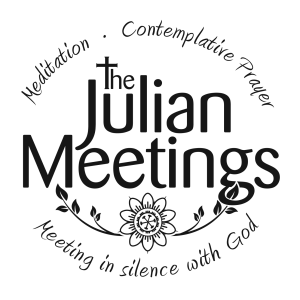We have recently started a new offering at both Christ Church and St. James’ alternately, on the 4th Sunday of the month at 6pm called a Julian¶ Meeting. And I feel this needs a little explanation!
It is based on the ancient Christian tradition of Contemplation.

I should like to dispel some popular misconceptions about the practice of contemplation. It is not just for those of us who are introverts, I’m an extravert, and it is not just for those people who we think are extra Holy or super Spiritual.
The practice of contemplation is simply the desire to sit in the presence of God, to meet with Jesus at a deep level, to connect with the Holy Spirit and to dwell among the Trinity. To let it mould and shape us into the people we are designed to be. It is an act of deep and profound surrender to a power greater than us. It is offering up our wills and our lives so that they may be bought into line with that of God. It is experience.
An experience of knowing that we are completely loved, completely accepted and pursued by our loving Father.
Contemplatives are often called mystics. This is not a scary word. A mystic is simply someone who has moved from mere belief systems or belonging systems to an actual inner experience.
So where does it come from?
Contemplation is an ancient Christian tradition. The desert mothers and fathers in the 2nd century were among the first to discover this way of living and being with God.
When Christianity became the state religion in Rome in 313 AD there were some good and some bad outcomes. The followers of Jesus were no longer persecuted for their faith, which was a good thing, but by making it the state religion – power and control, doctrine and dogma became controversial and time consuming and those in control influenced the development of the faith and some were unhappy with the direction it took.
As the Empire of Rome got involved there were some who felt that the true ‘Way’ was being lost, crowded out by hierarchy and power. The way that Jesus had taught – about coming alongside the marginalised, giving a voice to the powerless and the outcast was being run rough shot over by the empire of Rome. They sought to escape this control and to re-establish their lives and live as Jesus had taught them.
They felt that their faith was being controlled by a new ‘religion’ and they went out into the deserts of Egypt, Palestine and Syria to find Spiritual freedom to live out Jesus’ teachings and to continue growing in the Spirit. It was in these deserts that a different mind called contemplation was taught.
The previous Archbishop of Canterbury, Rowan Williams told the Synod of Catholic Bishops in Rome,
“Contemplation is very far from being just one kind of thing that Christians do: it is the key to prayer, liturgy, art and ethics, the key to the essence of a renewed humanity that is capable of seeing the world and other subjects in the world with freedom – freedom from self-orientated, acquisitive habits and the distorted understanding that comes from them. To put it boldy, contemplation is the only ultimate answer to the unreal and insane world that our financial systems and our advertising culture and our chaotic and unexamined emotions encourage us to inhabit. To learn contemplative practice is to learn to live truthfully and honestly and lovingly. It is a deeply revolutionary matter”.
So that’s the background. But how does it work I here you ask? What do I have to do?
I can really only comment on own personal experience. Contemplation means being silent. And that can initially be daunting, scary and feel like a waste of time. But bear with it!
Being still, being silent means stopping. Being busy isn’t just an act of physical exertion – rushing from one demand to another – being mentally busy can be even more exhausting. My head feels like a washing machine at times especially when I physically stop.
For me, the discipline of physically and mentally stopping is vital. In this sacred space I can remember who I am in Christ. I can look at my life, count my blessings and be grateful. But it is a discipline and it takes practice. To begin with my head would be crowded with the ‘to do’ list but over time I have been able to park these thoughts, knowing that I can return to them.
I find it a relief not to have to find the words to communicate with God. The relief of just sitting in his presence can be overwhelming. This place of rest is where I long to operate from. It is a place without expectation. Without expectation of me or God. I don’t come to gain wisdom or receive grand visions, it is a place to come as I am – with all that I am and with all that I am not. It is a place of humble access, where paradoxically, I can be and know that I am nothing but yet I am everything.
There are of course times of prayer and petition, of talking and listening, but these times of silence are, to me, the most precious and life giving moments of my day.
I have read much about different types of silence including Richard Rohr, Thomas Keating, Thomas Merton and Cynthia Bourgeault and there is much to learn and practice, but ultimately in its essence it is simple.
Be still and know that I am God.
¶ Julian of Norwich was an English mystic of the middle ages and experienced God through contemplation and a society sprung up encouraging us to re-discover this form of encounter with God.
Rev’d Kia Pakenham October 2022
Abinger Common, Surrey RH5 6HZ ///delay.trials.plans
Tel: 01306 737160


Data Protection & Privacy
We do not track any browsing activity on this website.
We may sometimes link to external sites and social media but are not responsible for the content of these websites and you should refer to their individual privacy and cookies policies.
If you are included in an event photo and do not wish to be please contact us and we will remove – Contact Us

If you would like to apply for a Login account to help update this site, please email the web team here.